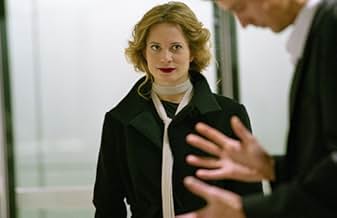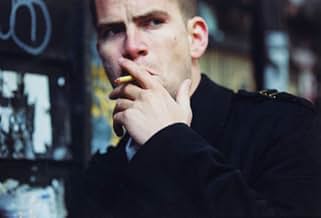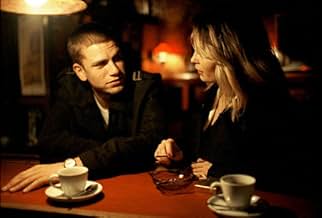Reconstruction
- 2003
- Tous publics
- 1h 32m
IMDb RATING
7.3/10
7.7K
YOUR RATING
A young man who thought himself already in love with a nice girl is drawn into a literary drama when he is captured by a deep and stimulating love affair.A young man who thought himself already in love with a nice girl is drawn into a literary drama when he is captured by a deep and stimulating love affair.A young man who thought himself already in love with a nice girl is drawn into a literary drama when he is captured by a deep and stimulating love affair.
- Director
- Writers
- Stars
- Awards
- 12 wins & 11 nominations total
Carlos Claro Schelin
- Mercedes Sand
- (as Mercedes Claro Schelin)
Line Søndergaard Poulsen
- Girl in metro station
- (uncredited)
- Director
- Writers
- All cast & crew
- Production, box office & more at IMDbPro
Featured reviews
"Reconstruction" was an excellent movie. Some have renounced it for its little tricks. Shame on them. While the little tricks themselves weren't impressive, they contributed to the film's ideas. Maria Bonnevie was enchanting. Interestingly, when I left the theater, I felt as though I knew (and perhaps loved) Aimee even though she was a construction, a fiction about whom next to nothing was revealed. In this manner, Alex and I bonded although there is no Alex. This movie was something that viewers can feel. I loved the skepticism. I enjoyed belong dazzled by the beauty only to have it taken away. Was it ever there? There is an honesty in "Reconstruction" that is rare in cinema. This movie wasn't especially subtle in its nihilism, which was fine. Anything more subtle would have been wasted on many, maybe even me. Who knows?
First things first: I find pointless to summarize the plot, therefore I'll stick to my own thoughts about it.
Grainy fade-outs, near-flawless performances, mind-gripping in its non-linear simplicity plot, endless possibilities (if you are prone to indulging in analysis) and a precise, clean-cut overall aspect- are all there, in Boe's beautiful, if slightly formal, first long feature.
This film dodges, quite effortlessly, the one major shortcoming (if you ask me)of Last Year In Marienbad, to which it has been compared; unlike the former, Reconstruction manages, through unmistakably warm-bloodied and wrapped in smoke actors'performances, to surpass the cartoonish, slightly de-humanized concept that pervades Resnais's (i dare utter the word) masterpiece. In other words, the characters are a significant little more than archetypes, they are individuals. Subsequently, the three A's (Alex, Aimee-stunning Marie Bonnevie- and August) stir vaguely-rooted emotions in the spectator, aided by the 3-dimensionality of their acting and enhanced by innumerable, purposeful close-ups and near-perfectly-fitted music.
The intelligent rather than inventive script receives "thumbs up" not for itself but for its glossy, yet not sultry, rendition by often unbearably beautiful shots. Also, the demure approach to sexuality speaks volumes about the power of the camera&actors unity to suggest powerful feelings.
The coherent-enough story (don't let yourselves taken in by deceptive ambiguity) escapes down-and-out moronic de-constructivism for its own sake, allowing thus the average movie-goer to suck the film in, irrespective of his cultural background.
Although data about the characters arrives in dribs and drabs, the film is carefully plotted and succeeds in keeping the spectator's interest up till the end. August, in spite of apparent filmic omnipotence, is bare-handed against the efficiency of tender, scintillating and dizzying love story; the real puppeteer is the director, through his double, the cigarette-levitating, literal charmer, who pulls the strings in this bittersweet faerie. So, once you've learned the ropes of his editing choices and non-linear story ( the 3 possibilities/photos the woman has and other details), which require at least one viewing, Reconstruction becomes more than a feast for the eye. It allows a sensitive insight into a terribly fragile dreamlike world: Orpheus is supposed never to doubt the flesh-and-bone unseen certainty of being followed by Euridice on their way out of the Inferno. The visually enticing, effective portraying of Alex and Aimee's every movement offers precious glimpses of their innermost thoughts.
Speaking flaws, a restraint from taking risks in points of frame composition (aka predictable angles, never going off the beaten track) is quite obvious BUT it actually seems reassuring. Also, the absence of a clear message might affect the appreciation of a part of the public, BUT this is small concern for the director, whose primary aim (stated in August's voice off, in the beginning) is not to convey a moral attitude or a manifesto, but to ease pure delight on the spectators. Nevertheless, the I-cannot-relate-to-it factor breeds suspicion as to the actual relevance of what we see = Why should I care? Meaning, this seemingly inconsequential display of beautiful shots and silences can't extend its influence beyond the immediacy of the 90min viewing. BUT this is highly-debatable, if you take into account different responses from different people.
What I've just said about Reconstruction is hopefully not a gratuitous eulogy, but a considerate comment on what seemed to me a remarkably 'polished' if visually engrossing experience. Throughout the film, one gets the impression of intruding, of being a nosy Parker in an almost perfect, smoothly-trimmed, classy-as-heaven human landscape. Not an emotionless cine-verite, not a sweeping melodrama, not a frowningly guru-ish food-for-thought crap, Reconstitution proves warm enough to be cherished, praiseworthy in terms of cinematography, an outstanding and promising debut.
Grainy fade-outs, near-flawless performances, mind-gripping in its non-linear simplicity plot, endless possibilities (if you are prone to indulging in analysis) and a precise, clean-cut overall aspect- are all there, in Boe's beautiful, if slightly formal, first long feature.
This film dodges, quite effortlessly, the one major shortcoming (if you ask me)of Last Year In Marienbad, to which it has been compared; unlike the former, Reconstruction manages, through unmistakably warm-bloodied and wrapped in smoke actors'performances, to surpass the cartoonish, slightly de-humanized concept that pervades Resnais's (i dare utter the word) masterpiece. In other words, the characters are a significant little more than archetypes, they are individuals. Subsequently, the three A's (Alex, Aimee-stunning Marie Bonnevie- and August) stir vaguely-rooted emotions in the spectator, aided by the 3-dimensionality of their acting and enhanced by innumerable, purposeful close-ups and near-perfectly-fitted music.
The intelligent rather than inventive script receives "thumbs up" not for itself but for its glossy, yet not sultry, rendition by often unbearably beautiful shots. Also, the demure approach to sexuality speaks volumes about the power of the camera&actors unity to suggest powerful feelings.
The coherent-enough story (don't let yourselves taken in by deceptive ambiguity) escapes down-and-out moronic de-constructivism for its own sake, allowing thus the average movie-goer to suck the film in, irrespective of his cultural background.
Although data about the characters arrives in dribs and drabs, the film is carefully plotted and succeeds in keeping the spectator's interest up till the end. August, in spite of apparent filmic omnipotence, is bare-handed against the efficiency of tender, scintillating and dizzying love story; the real puppeteer is the director, through his double, the cigarette-levitating, literal charmer, who pulls the strings in this bittersweet faerie. So, once you've learned the ropes of his editing choices and non-linear story ( the 3 possibilities/photos the woman has and other details), which require at least one viewing, Reconstruction becomes more than a feast for the eye. It allows a sensitive insight into a terribly fragile dreamlike world: Orpheus is supposed never to doubt the flesh-and-bone unseen certainty of being followed by Euridice on their way out of the Inferno. The visually enticing, effective portraying of Alex and Aimee's every movement offers precious glimpses of their innermost thoughts.
Speaking flaws, a restraint from taking risks in points of frame composition (aka predictable angles, never going off the beaten track) is quite obvious BUT it actually seems reassuring. Also, the absence of a clear message might affect the appreciation of a part of the public, BUT this is small concern for the director, whose primary aim (stated in August's voice off, in the beginning) is not to convey a moral attitude or a manifesto, but to ease pure delight on the spectators. Nevertheless, the I-cannot-relate-to-it factor breeds suspicion as to the actual relevance of what we see = Why should I care? Meaning, this seemingly inconsequential display of beautiful shots and silences can't extend its influence beyond the immediacy of the 90min viewing. BUT this is highly-debatable, if you take into account different responses from different people.
What I've just said about Reconstruction is hopefully not a gratuitous eulogy, but a considerate comment on what seemed to me a remarkably 'polished' if visually engrossing experience. Throughout the film, one gets the impression of intruding, of being a nosy Parker in an almost perfect, smoothly-trimmed, classy-as-heaven human landscape. Not an emotionless cine-verite, not a sweeping melodrama, not a frowningly guru-ish food-for-thought crap, Reconstitution proves warm enough to be cherished, praiseworthy in terms of cinematography, an outstanding and promising debut.
"Reconstruction" is a clever, European take on "Unfaithful" where an older husband uses literary intellect instead of violence to attempt "The Revenge of the Cuckold."
But we have no idea how much is real or imagined or roman a clef or the character of the author is identifying too much with his alter ego, as we are told from the outset that what we will be seeing is the magic of the storyteller or puppeteer, watching as he manipulates his characters, trying out different situations in different drafts of a novel, erasing and playing out different scenarios of chance and choice, where art replaces the memory science of "Code 46."
I don't think I was the only audience member, however, who was rooting instead for the tall, dark, handsome young man as Nikolaj Lie Kaas has captivating chemistry with Maria Bonnevie (and I feel really foolish that I couldn't tell from either the film or the Danish credits until I looked at the IMDb listing that she plays both the jilted girlfriend and the adulterous wife).
The author makes some lame justifications about women needing love and men accidentally falling into it, or some such, that doesn't quite make sense and the film is supposed to be illustrating the point that a man has to learn about hurt as a price to be able to love. The author's self-understanding I suppose is illustrated by him reading his book's dedication to his wife in a desperate plea for her to forgive him all his inattention, etc. as he needs her for his art, so she shouldn't look for passion elsewhere.
But we're left more with the very powerful visuals of the different versions of how he imagined her possible affair could have started (a la "Brief Encounter") and its ramifications or concluded, and the feeling that the older guy was a smug deus ex machina.
In the things one can learn from the movies department: we also get a nice tour of Copenhagen-- people can smoke anywhere, even on the subway, and do, constantly; restaurant bathrooms have real terry cloth towels; the Hilton is really luxurious; Danes and Swedes don't seem to exchange cell hone numbers; and, like in "Italian for Beginners," Danes seem to think of Italy as the place to go for romance.
But we have no idea how much is real or imagined or roman a clef or the character of the author is identifying too much with his alter ego, as we are told from the outset that what we will be seeing is the magic of the storyteller or puppeteer, watching as he manipulates his characters, trying out different situations in different drafts of a novel, erasing and playing out different scenarios of chance and choice, where art replaces the memory science of "Code 46."
I don't think I was the only audience member, however, who was rooting instead for the tall, dark, handsome young man as Nikolaj Lie Kaas has captivating chemistry with Maria Bonnevie (and I feel really foolish that I couldn't tell from either the film or the Danish credits until I looked at the IMDb listing that she plays both the jilted girlfriend and the adulterous wife).
The author makes some lame justifications about women needing love and men accidentally falling into it, or some such, that doesn't quite make sense and the film is supposed to be illustrating the point that a man has to learn about hurt as a price to be able to love. The author's self-understanding I suppose is illustrated by him reading his book's dedication to his wife in a desperate plea for her to forgive him all his inattention, etc. as he needs her for his art, so she shouldn't look for passion elsewhere.
But we're left more with the very powerful visuals of the different versions of how he imagined her possible affair could have started (a la "Brief Encounter") and its ramifications or concluded, and the feeling that the older guy was a smug deus ex machina.
In the things one can learn from the movies department: we also get a nice tour of Copenhagen-- people can smoke anywhere, even on the subway, and do, constantly; restaurant bathrooms have real terry cloth towels; the Hilton is really luxurious; Danes and Swedes don't seem to exchange cell hone numbers; and, like in "Italian for Beginners," Danes seem to think of Italy as the place to go for romance.
In Copenhagen, the photographer Alex (Nicolaj Lie Kaas) is the boyfriend of Simone (Maria Bonnevie) and the Swedish painter Aimee (Maria Bonnevie) is the wife of the writer August Holm (Krister Henriksson). When Alex meets Aimee in a bar, they have one night stand and falls in love for each other. However, on the next days, Alex is forgotten by his girlfriend and friends, and sees his world vanishing and his romance with Aimee re-initiating.
"Reconstruction" is an intriguing and surrealistic romance that follows the school of David lynch. All the characters are needy of love, and one possible interpretation (actually my interpretation) for the plot is that August is writing his novel inspired in the needy of his wife an muse Aimee that feels lonely with his constant absence due to his lectures and meetings with his editor Monica. He develops and affair of the character Aimme with the also fictional Alex, a man that has difficulties to commit with and believe in love, being hard for him to say "I love you" to Simone. When Alex meets Aimee, he leaves his past relationship behind but it is hard for him to believe in the love of Aimee and he loses her, and the magic of their love is never accomplished. If the viewer is seeking an original screenplay raising many questions without much explanation and open to interpretation, supported by great performances and wonderful cinematography and music score, he or she will certainly love this little gem. Last but not the least, Maria Bonnevie is a very pretty and seductive woman. My vote is eight.
Title (Brazil): "Reconstrução de um Amor" ("Reconstruction of a Love")
"Reconstruction" is an intriguing and surrealistic romance that follows the school of David lynch. All the characters are needy of love, and one possible interpretation (actually my interpretation) for the plot is that August is writing his novel inspired in the needy of his wife an muse Aimee that feels lonely with his constant absence due to his lectures and meetings with his editor Monica. He develops and affair of the character Aimme with the also fictional Alex, a man that has difficulties to commit with and believe in love, being hard for him to say "I love you" to Simone. When Alex meets Aimee, he leaves his past relationship behind but it is hard for him to believe in the love of Aimee and he loses her, and the magic of their love is never accomplished. If the viewer is seeking an original screenplay raising many questions without much explanation and open to interpretation, supported by great performances and wonderful cinematography and music score, he or she will certainly love this little gem. Last but not the least, Maria Bonnevie is a very pretty and seductive woman. My vote is eight.
Title (Brazil): "Reconstrução de um Amor" ("Reconstruction of a Love")
I saw this movie at the London Film Festival, introduced by Boe the director and the beautiful Bonnevie, the lead actress. Boe is a graduate of the Danish film school and, as you might expect, the film is packed with movie references from Bergman to Hitchcock via Lynch. I hope the movie picks up a UK distributor as a second viewing is needed to understand the movie fully. On one viewing alone, this is an intelligent, intriguing and thought provoking movie with an excellent sense of time and place (Copenhagen, the present, even though no-one seems to have a mobile phone!), clever cinematography and editing and good performances. Boe creates a vision of Copenhagen as a labyrinthine, alien jungle where your front door may disappear and your friends have never seen you before.
Highly recommended
Highly recommended
Did you know
- Quotes
Narrator: It is a film. Everything is constructed. Still it hurts.
- ConnectionsFeatured in Trier, Kidman og Cannes (2003)
- SoundtracksAdagio for Strings
by Samuel Barber
- How long is Reconstruction?Powered by Alexa
Details
Box office
- Gross US & Canada
- $73,516
- Opening weekend US & Canada
- $13,629
- Sep 12, 2004
- Gross worldwide
- $471,107
- Runtime1 hour 32 minutes
- Color
- Sound mix
- Aspect ratio
- 2.35 : 1
Contribute to this page
Suggest an edit or add missing content



























